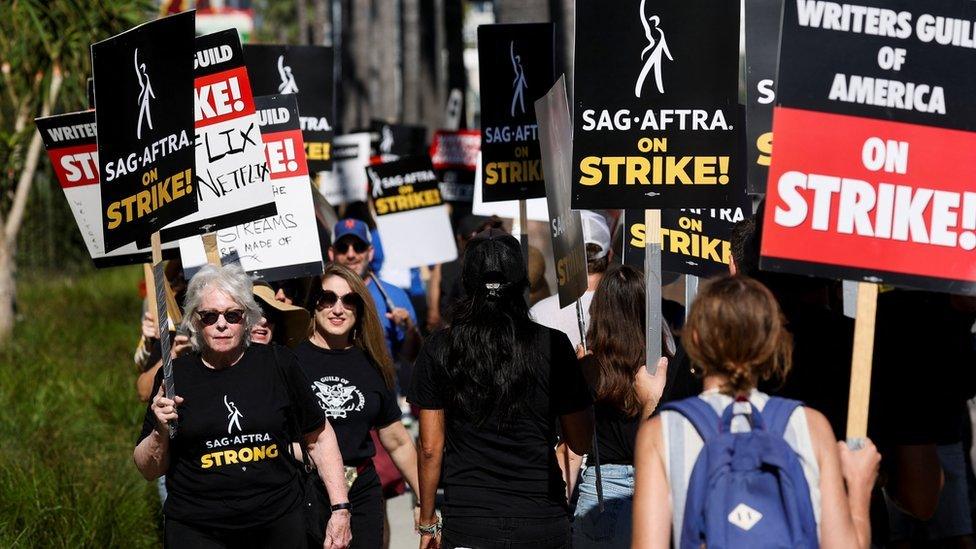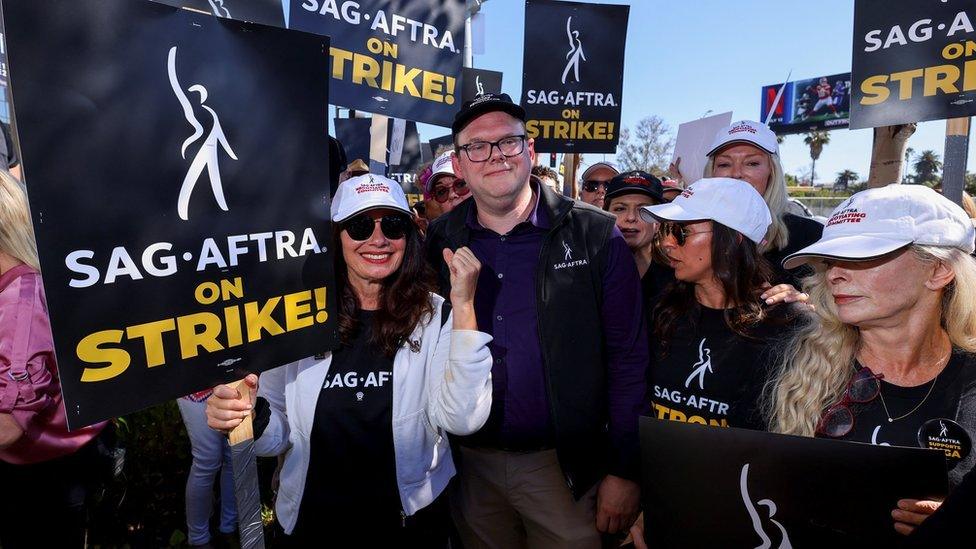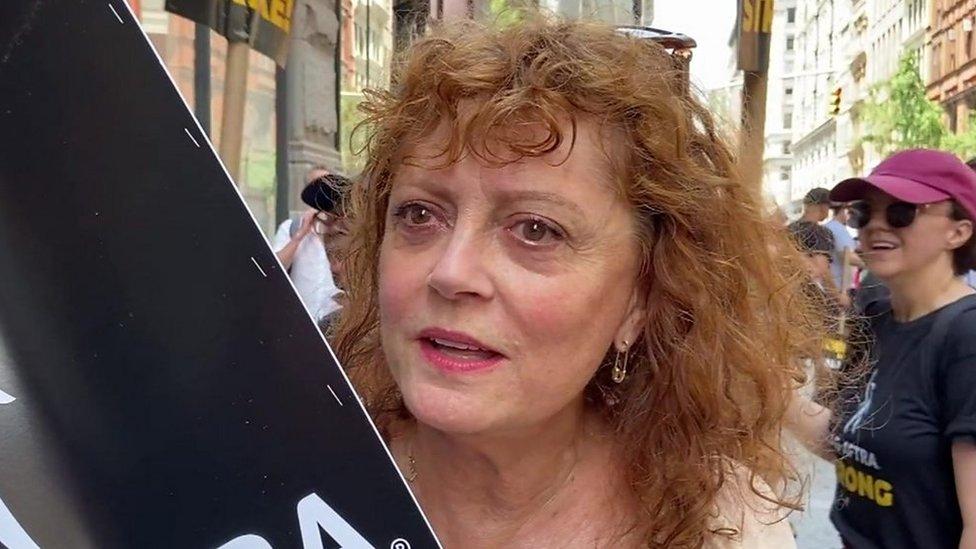SAG strike: Why Hollywood actors have walked off set
- Published

Hollywood has entered unscripted territory as negotiations between major studios, screenwriters and actors have collapsed.
For the first time in decades, both writers and actors are manning picket lines to demand better contracts.
At stake, they say, is the future of their careers. But studio executives have said their demands are unreasonable, leaving Tinseltown at an impasse.
Here's why Hollywood is on strike.
Who are the players?
There are three major players involved in the negotiations.
The Screen Actors Guild and the American Federation of Television and Radio Artists (SAG-AFTRA) union speaks for more than 160,000 members who include actors, stunt co-ordinators, voiceover artists and background actors.
The Writers Guild of America (WGA) is a union that represents writers in film, television, radio and online.
And the Alliance of Motion Picture and Television Producers (AMPTP) represents major film studios like Disney and Paramount, American television networks like Fox and NBC, and streaming giants like Netflix and Amazon.
Talks broke down for several reasons. Let's walk through a few of them.
Show me the money
The advent of streaming has reshaped the way the world consumes TV and films, but it's also changed how actors are paid.
Typically, actors and writers are paid upfront for their work, but many maintain their income through residuals, steady compensation based on re-runs of TV shows and films. When shows were syndicated across ad-supported networks, residual cheques could sustain veteran actors, like SAG president Fran Drescher, throughout their careers.
But streaming has changed that. Both actors and writers say their residuals have plummeted and it is destroying their livelihoods.
Michael Patrick Lane has been acting in Hollywood for more than a decade. But he told BBC News he's made as little as $300 (£229) in residuals for five episodes of television. After paying for acting classes, agents and managers Mr Lane said he barely takes home $20,000 (£15,200) a year.
"Even though I'm a consistent working actor, for the most part, these last few years, I can't take care of my family," he said, adding that it's delayed his plan to have kids.
SAG-AFTRA says members are striking for more equitable division of the profits from movies and television. But according to the AMPTP, SAG negotiators chose to forego "the highest percentage increase in minimums in 35 years" in favour of going on strike.
"The AMPTP presented a deal that offered historic pay and residual increases," the studio bosses said. "The Union has regrettably chosen a path that will lead to financial hardship for countless thousands of people who depend on the industry."
Watch: How the Hollywood strike affects you in 75 seconds
Striking for healthcare
Maya Gilbert-Dunbar is a dual member of SAG and the Writers Guild who is now running for SAG-AFTRA president. She said the majority of members in the SAG union barely make above minimum wage.
"The bulk of our membership are career background actors," she said. "These people are barely making $150 (£114) a day."
For many actors, joining SAG-AFTRA is also the only pathway to health insurance. But Ms Dunbar estimates only 15% of the union's 160,000 members make the required $26,000 a year to qualify for healthcare coverage. What's more, she said "elder" actors are kicked off the insurance plan after they turn 65.
AMPTP says it has proposed "substantial increases in pension and health contribution caps".
The future of AI
While countless blockbusters warned of the dangers of AI, few could have predicted it would lead to Hollywood's first major strike in decades.
The AMPTP says it offered SAG a "ground-breaking AI proposal which protects performers' digital likenesses, including a requirement for performers' consent for the creation and use of digital replicas or for digital alterations of a performance".
But at the press conference announcing the strike, SAG's chief negotiator, Duncan Crabtree-Ireland, explained why the union flatly rejected the idea.
"They proposed that our background performers should be able to be scanned, get one day's pay, and their company should own that scan, their image, their likeness and should be able to use it for the rest of eternity, in any project they want with no consent and with no compensation."
"So if you think that's a ground-breaking proposal, I suggest you think again."
How long will this last?
For now at least, both sides seem firmly dug in. A strike often means that neither side is willing to negotiate, and it could take time for both unions to return to the table. The last time both writers and actors manned the picket line, the strike lasted 10 weeks and was led by then-actor Ronald Reagan.
The writers' strike is already in its third month with no end in sight.
While the strikes last, don't expect to see Hollywood stars at film premieres, festivals, conventions or red carpets. Union rules prohibit actors from taking any work, including promotion or publicity for projects.
"A strike isn't the end, it's the beginning, unfortunately," Ms Dunbar said, adding that she hopes that in the end both parties can agree on a suitable contract.
"We're going to strike, people can't work, [but] you have to secure a deal that justifies doing this. And that's what I hope happens," she said.
Watch: The famous faces out and about on the picket line supporting the Hollywood strike
Related topics
- Published15 July 2023

- Published15 July 2023
